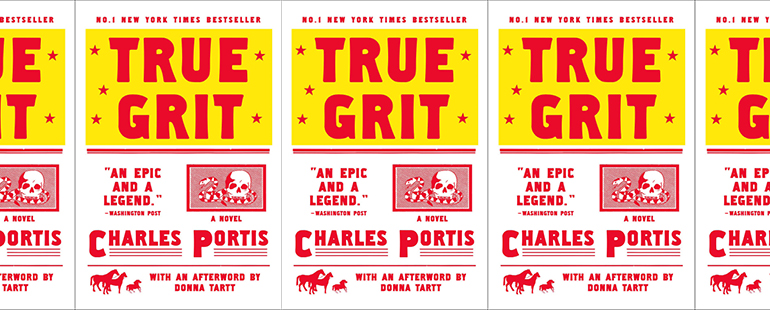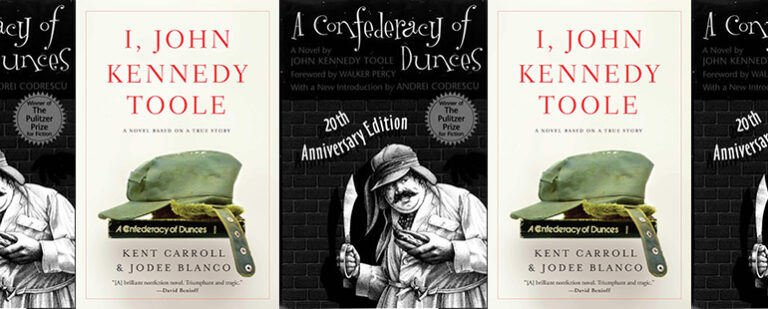Place and Character in True Grit

Charles Portis’s 1968 Western masterpiece, True Grit, has received renewed interest in recent years thanks to the Coen brothers’ elegant 2010 adaptation, but the novel has timeless relevance in its poignant explorations of several types of paradoxes or “borderlands”: its Arkansas/Oklahoma geography (and the area’s many mixed-race inhabitants); the subversion of gender and age roles in its inimitable heroine, Mattie Ross; moral complexity juxtaposed against religious orthodoxy; and the unconventional dynamics of family or family-like relationships. By examining Mattie’s relationship with Rooster Cogburn more closely, we can gain greater insight into the various layers of paradox exemplified in these characters that represent a unique story set in a particularly liminal time in American history.
Set against the backdrop of Arkansas and the Indian Territory that pre-dated Oklahoma statehood, Portis’s story brings the landscape to life through his characters. One simplistic reading could interpret Mattie and Rooster as symbols of two opposing forces in the mythic American Western frontier, as they in some ways represent a culture trying to rebuild itself in the wake of civil war and changing social norms. Gratefully, however, Portis crafts them with such depth and authenticity that they transcend these easy categories. The novel demonstrates how a story’s setting can be inextricably linked to its other elements: it would be hard to imagine Mattie and Rooster anywhere but here.
Mattie’s character is exemplified in the novel’s opening sentence: “People do not give it credence that a fourteen-year-old girl could leave home and go off in the wintertime to avenge her father’s blood but it did not seem so strange then, although I will say it did not happen every day.” As she gives an account of her adventure with the hindsight of adulthood, Mattie emerges as a woman of conviction and fearlessness—traits that also served her well at the time of the story. She regularly quotes Scripture and speaks with confidence about her mission of vengeance; there is no irony in her single-mindedness, for she has a childlike tunnel vision, bent on pursuing justice for her father’s senseless death. She has no patience for people who try to dismiss her as a young girl because she has already learned that “if you want anything done right you will have to see to it yourself every time.”
Rooster Cogburn, Mattie’s hired partner and a US marshal, reflects a similar ethos when he declares to her, “I was born game, sis, and hope to die in that condition.” She chooses him instantly after hearing him described as “the meanest one…a pitiless man, double-tough, and fear don’t enter into his thinking,” unconcerned with the additional observation that he “loves to pull a cork.” Our first encounter with Rooster is in the courtroom, where he is questioned about his tendency to shoot first and ask questions later. Ready to defend himself, he declares, “I never shot nobody I didn’t have to.” When asked how many, he clarifies with a question: “Shot or killed?” While this attitude already indicates a certain moral complexity, he also reflects a sentiment familiar to Mattie: “I always try to be ready.” Since Mattie plans to see her father’s killer, Tom Chaney, executed, this glimpse of Rooster convinces her that he is the right man for the job.
With this common aim in mind, Mattie and Rooster enter the Indian Territory and encounter a geographical and moral kind of wilderness—new to Mattie, too familiar to Rooster. In this environment, survival in the face of evil trumps the letter of the law (legal or biblical). Before leaving Fort Smith, Mattie had acknowledged that she thought the small city belonged in the Territory rather than in her home state, Arkansas. In this way, Fort Smith becomes a threshold on the border between her comfortable sense of home back in Yell County and the land of Indians, “half-breeds,” and various unsavory characters that awaits her. It is in this liminal space that this young, “civilized” woman convinces an aging, rugged man that she belongs there, too, despite the reader’s growing awareness that she may end up getting in over her head.
Regardless, Mattie’s willingness to defy others’ expectations of her age, gender, and culture earns her respect from the rough men she meets—and alienates her from other people. She must continually prove herself as someone willing to do whatever needs to be done while operating under an unflinching faith in Christian principles. Rooster feels a similar conviction in avenging the death of his friend and partner, Potter, which partly explains his lack of hesitation in attacking the men responsible for Potter’s death. Mattie similarly has no qualms about shooting Tom Chaney, both to defend herself and to see that justice is accomplished. For both characters, grief is expressed through bold action that leaves them in some ways estranged from the larger systems to which they are bound, social in Mattie’s case and legal in Rooster’s. In this respect, grief itself becomes a sort of borderland, as each character’s unrelenting loyalty to the men they have lost unfairly disconnects them from the world, forcing them to carry on by themselves.
By acting out this sense of grief and isolation together, Rooster and Mattie come to form a sort of family-like bond that only lasts during their adventure in the Territory. We see this most poignantly on two occasions near the end of the novel. After Rooster rescues Mattie from a snake pit and discovers she has been bitten, he rushes her across the Territory through the night: first on horseback (until the horse is driven to death), then on his own back, and eventually in his arms until he commandeers a wagon and mules at gunpoint to get her to safety—all while neglecting his own fresh gun wounds. As Rooster is neither young nor particularly healthy, this is no small feat, but he does whatever it takes to save Mattie. In the borderland of the Territory, survival is all that matters, and he proves as loyal to her as he was to Potter. Many years later, when Mattie is a grown woman (and a one-armed “old maid”), she tries to reconnect with Rooster only to learn he has just died of age and exhaustion, out on tour with an old Wild West show—her hero reduced to a spectacle of himself, echoing the perception others have of Mattie too. She makes a point of transferring his body to her family plot and comments on how other people found this strange. She has no time for their judgment, and instead buys Rooster a headstone that reads “A RESOLUTE OFFICER OF PARKER’S COURT.” Coming from Mattie, this choice of words is especially powerful: it indicates that she has decided to overlook Rooster’s various misadventures from before and after their time together, preferring that he be remembered for what she saw as his true character. Despite the time and distance between them, she chooses to make this Rooster’s legacy and to see that he leaves this life with dignity.
Ultimately, their resolve marks both Mattie and Rooster as outsiders. As the borderlands give way to more rapid settlement at the turn of the century, each character bears scars from their “lively times” and is not fully understood by the people around them. When Mattie visits the Wild West show to find Rooster, she reflects, “These old-timers had all fought together in the border strife under Quantrill’s black standard, and afterward led dangerous lives, and now this was all they were fit for, to show themselves to the public like strange wild beasts of the jungle.” Mattie, “a woman with brains and a frank tongue and one sleeve pinned up,” can relate to this feeling. The uniqueness of the Arkansas-Oklahoma region, a borderland of the South and West, can sometimes leave people with a sense of being loyal to their people but ultimately responsible only to themselves. As an eastern Oklahoma resident myself who has settled in Fort Smith in adulthood, Portis’s novel evokes this in-betweenness so powerfully that it resonates today as well as in the time that his story takes place. In the end, both characters find themselves out of place but unwilling to relinquish the core of their personalities. Both have always “done the best we could with what we had.”


